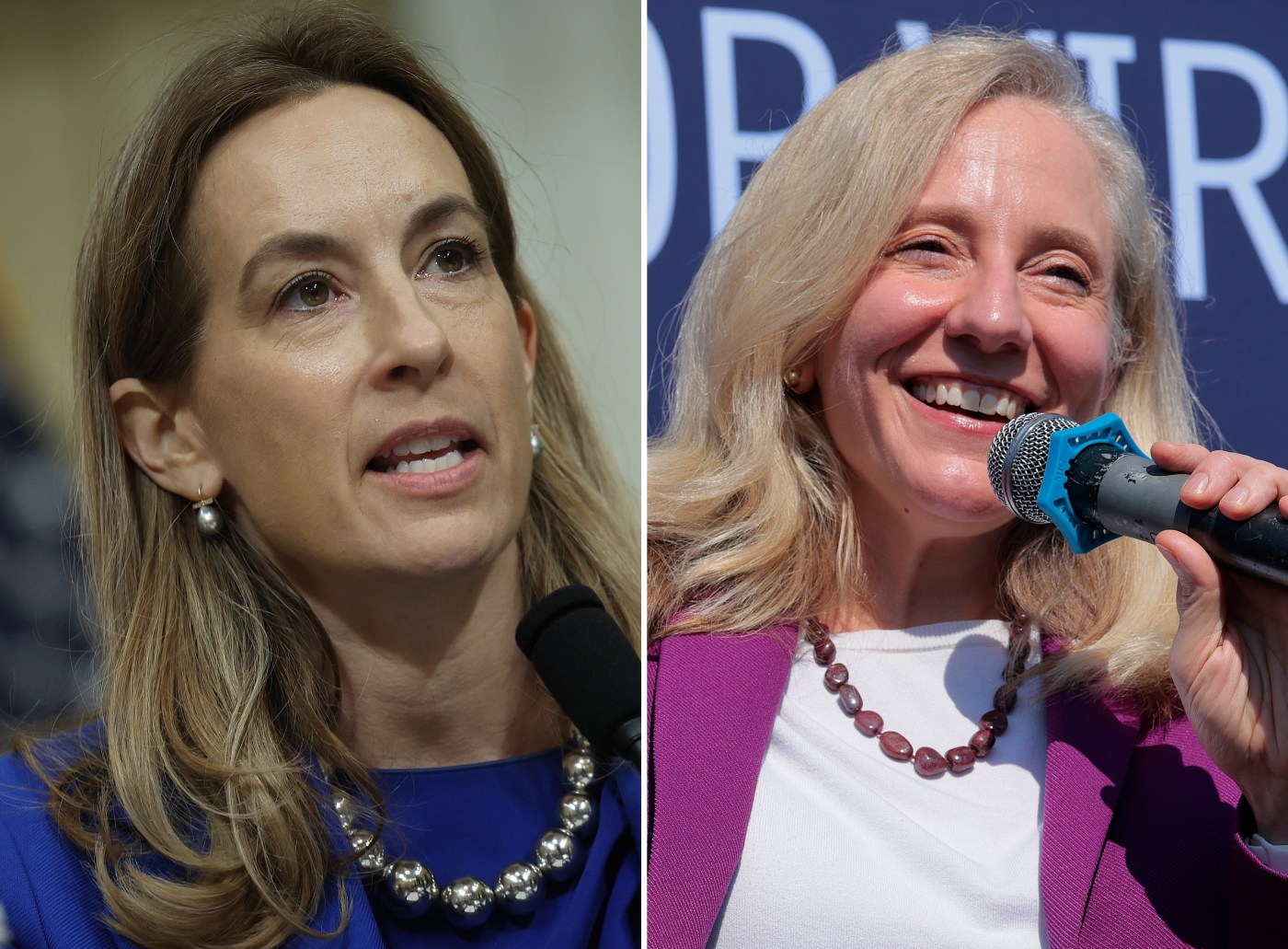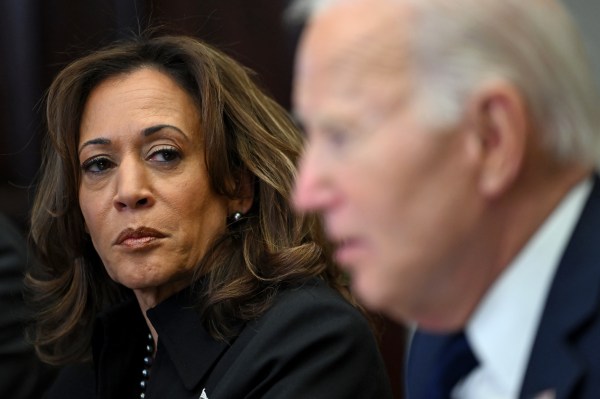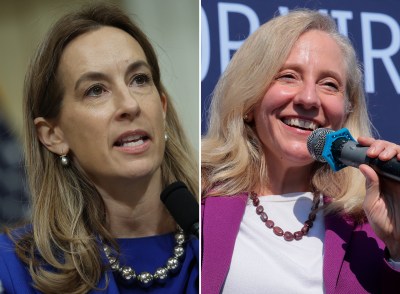The Democratic nominees for governor in New Jersey and Virginia are dodging questions about their positions on transgender rights, a symptom of a political ailment that continues to afflict the party nearly a year after President Donald Trump rode this thorny cultural issue to a second White House term.
Rep. Mikie Sherrill and former Rep. Abigail Spanberger, who top the Democratic tickets in New Jersey and Virginia, respectively, in this fall’s key off-year elections, are pragmatic military veterans. Both are articulate and generally focused on affordability and other issues voters tell pollsters they care about. But on transgender rights—especially whether transgender females should be permitted in girls’ and women’s sports—Sherrill and Spanberger appear hesitant and unclear regarding how they would govern if elected in November. Republicans, conversely, are quick and unequivocal.
They oppose biological boys—terminology Republicans prefer—playing women’s sports. Voters agreed in 2024, a confluence of opinion that helped boost Trump over then-Vice President Kamala Harris. And voters still agree, according to polling conducted since last Election Day, with 69 percent of Americans believing athletes should compete on teams aligned with their birth sex. The GOP’s steadfast approach has put a spotlight on Sherrill and Spanberger, candidates whose squeamishness is a prime example of a Democratic Party caught between public opinion and left-wing activists on an issue that could bleed popular support—if not this year or next, in 2028.
“Democrats are scared to death of other Democrats—and especially petrified of Democratic interest groups,” Michael LaRosa, a party operative and veteran of former President Joe Biden’s White House staff, told The Dispatch.
“If voters don’t trust us on culture, they won’t trust on health care or the economy,” added LaRosa, who is gay and prior to his political career was a college swimmer for Seton Hall University in South Orange, New Jersey. “Right now, Democrats look out of touch with the majority of Americans.”
Sherrill’s lead over the Republican nominee, former state lawmaker Jack Ciattarelli, is solid but has tightened; Spanberger’s lead over Republican nominee, Lt. Gov. Winsome Earle-Sears is commanding. Both contests are unfolding in blue states where Democratic voters dominate. Perhaps that’s why the Sherrill campaign declined to comment for this story; and why the Spanberger campaign did not respond to multiple requests for comment; despite both having been responsive to The Dispatch in the past.
Here’s how Sherrill addressed transgender sports participation in K-12 schools in February, during a Democratic primary debate: “We have to do better at protecting vulnerable people, but we can’t fall into these traps because we’re losing and we need to win on this issue,” the congresswoman said, as part of a lengthy answer that did not take a firm position.
Spanberger, at least, has commented on the issue recently, and with some specificity—although not much. Here’s her response to a question from local television reporter in September:
I would support a bill that would put clear provisions in place that provide a lot of local ability for input based on the age of children; based on the type of sport; based on competitiveness, because certainly I recognize—I absolutely recognize—I’m the mom of three daughters in Virginia public schools. They participate in all activities across the board. I recognize the concern that families and community members might have about the safety of their own kids, about competitiveness, about fairness. The process that was in place for 10 years was one that was working, was one that took individual circumstances and individual communities into account. And I think that that is the process that Virginia should continue to utilize.
Spanberger was referring to Virginia’s policy of allowing transgender high school students to file waivers requesting permission to compete with athletes of the same gender with which they identify. Spanberger’s broader comments happen to reflect messaging advice from Third Way, a centrist-Democratic think tank.
Third Way (and other Democratic groups) has been highly critical of the party’s approach to politically charged cultural issues, warning that Democrats risk losing the 2028 presidential election absent major changes on policy and communications, much to the chagrin of left-wing activists. For instance, Third Way argues that Trump defeated Harris in part because a majority of voters tend to oppose transgender girls and women participating in women’s sports. Still, the think tank is not advising Democrats to adopt Republican messaging.
Rather, Third Way is urging Democrats to acknowledge and agree with concerns related to competitiveness, fairness, and physical safety but advocate that regulations be devised locally—by sports leagues, and by interscholastic and collegiate athletic associations and similar agencies. And in a nod to Democratic coalition sensibilities: Do say “transgender girls”; do not say “biological boys.” Additionally, Third Way and like-minded groups have data suggesting voters want candidates to “stop obsessing” over social issues like this that involve so few people, and instead concentrate on the economy.
Meanwhile, Third Way’s polling on this issue conducted by the Democratic firm Global Strategy Group revealed that roughly half of Democratic primary voters oppose government bans on transgender girls participating in women’s sports, but that those same voters support “guardrails” and “rules” implemented locally that might result in prohibitions in some circumstances. Another quarter of the Democratic primary electorate believes bans should be in place in all circumstances, according to this survey. (The remaining 25 percent believes in no prohibition under any circumstance.)
Pollster Angela Kuefler, who fielded the survey, explained the breadth of the Democrats’ challenge on this issue last week during a briefing for reporters at Third Way’s offices in Washington, D.C. To make her point, Kuefler pointed to voters’ views on transgender rights that emerged from the 2024 presidential campaign.
“The scariest number I saw post-[2024]-election was: 60 percent of voters thought that Democrats thought there should be no rules—that anybody should be able to play whatever they want and that there should be no rules on health care for young people, that young people should be able to get health care without their parents’ consent,” she said. “Those are not popular positions.”
Rob Sand, a Democrat running for governor in Iowa in the 2026 midterm elections, seems to grasp the gravity of this issue with voters. He told a conservative talk radio host earlier this year that he opposes transgender girls playing women’s sports with zero caveats. Asked if “biological boys or men should be able to play women’s sports,” Iowa’s elected state auditor said: “No.” No caveats were added, and Sand’s campaign, confirming his position has not changed, doesn’t believe it has cost him material support on the left.
But if Sand proves to be a rarity within his party, Republicans expect the issue will continue to dog Democrats for the foreseeable future.
Mark Harris, top adviser to Earle-Sears, rejects assertions that voters want candidates to ignore transgender issues in favor of topics like affordability. Indeed, he said the Virginia lieutenant governor’s campaign is publicizing Spanberger’s nuanced position on transgender girls participating in women’s sports because, No. 1, it’s resonating and No. 2, the former congresswoman’s multilayered answer to questions about where she stands on such a visceral issue is sowing doubts about her leadership abilities.
“This is the best issue that I have in my arsenal,” Harris told The Dispatch. “Democrats have tied themselves in knot after knot after knot about it—frankly because they’re scared of their rich, white elite base. This is a new reality.”







Please note that we at The Dispatch hold ourselves, our work, and our commenters to a higher standard than other places on the internet. We welcome comments that foster genuine debate or discussion—including comments critical of us or our work—but responses that include ad hominem attacks on fellow Dispatch members or are intended to stoke fear and anger may be moderated.
With your membership, you only have the ability to comment on The Morning Dispatch articles. Consider upgrading to join the conversation everywhere.